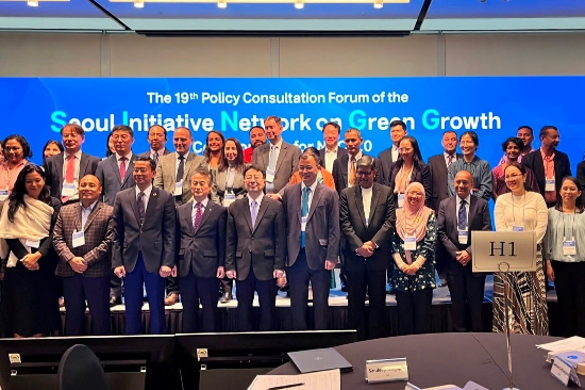Organized by the United Nations Economic and Social Commission for Asia and the Pacific (ESCAP) in partnership with South Korea’s Ministry of Environment, the forum focused on the theme, “NDC 3.0: National Efforts and Regional Collaboration on Climate Action in Asia-Pacific.”
The forum aimed to discuss and share experiences in preparing, implementing, and updating Nationally Determined Contributions (NDCs), particularly regarding coordination between greenhouse gas mitigation and climate adaptation, as well as applying nature-based solutions. Participants also discussed strengthening bilateral and multilateral international cooperation towards carbon neutrality among Asia-Pacific member states.
Viet Nam was represented by officials from the Ministry of Natural Resources and Environment and the Ministry of Agriculture and Rural Development. Vietnamese delegates shared the country’s national NDC, the NDC for the Agriculture, Forestry, and Other Land Use (AFOLU) sector, and several greenhouse gas mitigation projects.
 Delegates at the forum
Delegates at the forum
Speaking at the opening session on October 28, Mr. Young Seok Lee, Vice Minister of Environment for South Korea, emphasized the timeliness of the forum, held just two weeks before COP29 in Baku, Azerbaijan.
During COP28 in late 2023, parties achieved the establishment of a Loss and Damage Fund, which has so far raised nearly USD 700 million, with South Korea contributing USD 7 million. Mr. Lee stressed that achieving net-zero emissions requires participation and cooperation from all stakeholders, including governments, development partners, and the private sector. He encouraged forum participants to share information and strengthen national cooperation across the region to build effective NDCs.
Mr. Byung Ok Ahn from the Korea Environment Corporation stated that the forum provides an opportunity for sharing information and experiences on sustainable development, green growth, and climate change adaptation solutions. He highlighted that regional cooperation in Asia-Pacific is essential to achieving NDC goals, particularly through technology adoption, knowledge sharing, and capacity building to enhance climate resilience among countries. He also emphasized that technology sharing, technology transfer, and financial support play a significant role in boosting climate response effectiveness and implementing climate adaptation strategies.